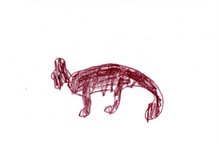 Ah, the weekend! On our schedule: a soccer practice, a soccer game, a haircut for Dean, grocery shopping, an appointment with the driveway guys who need to re-do the "job" they did for us last fall (a long, sad, story summed up by a staggering amount of money spent for a driveway that now floods our garage all winter), Dean's piano recital, and a retirement party for our Head of School. We also plan to pick up a few more plants to replace a portion of the garden destroyed by deer last winter and, theoretically, plant them. Figure in the hour+ of dog walking each day, meals, and whatever I'm forgetting (because I'm always forgetting something) and there you have it. And we only have one child! I cannot begin to fathom how families with more children manage.
Ah, the weekend! On our schedule: a soccer practice, a soccer game, a haircut for Dean, grocery shopping, an appointment with the driveway guys who need to re-do the "job" they did for us last fall (a long, sad, story summed up by a staggering amount of money spent for a driveway that now floods our garage all winter), Dean's piano recital, and a retirement party for our Head of School. We also plan to pick up a few more plants to replace a portion of the garden destroyed by deer last winter and, theoretically, plant them. Figure in the hour+ of dog walking each day, meals, and whatever I'm forgetting (because I'm always forgetting something) and there you have it. And we only have one child! I cannot begin to fathom how families with more children manage.But things will slow down. Soccer ends after next weekend. School gets out in two weeks. There will be a short break before summer piano lessons start. We sometimes wonder why we don't have people over more often -- we would like to entertain more. But then when we look at our lives in terms of the to-do list, it's clear that there isn't space to work in more. Ken's parents get frustrated with us because they have a hard time believing when we say, in response to their demands for family get-togethers, that we don't have a free weekend until the end of June. But it's true. And so for us that now means that we don't have a free weekend until July. But then, oh baby, we'll do our best to do as little as we can.
My projects are on hold at the moment. Friends from Ireland arrive the day after school gets out and we all head up to Maine for a week of salt air, sunshine, and lobster. This is an excellent use of our time. But in the meantime I'm cleaning the house and getting ready so the sewing and crafts things gather dust for a while.
Meanwhile, can you think of anything in nature (in New England) that begins with a 'k'? I've got my 'k' letter form photo done but am stumped by finding something that begins with 'k.' My brain is stuck on 'kangaroo' and they are rare in these parts.








8 comments:
K: I say look for a *kiss.*
I miss entertaining too. I think it's a matter of simply daring to put it on the schedule. It's true, though, weekends fill up fast and between one thing and another, it's a wonder how we keep up... or not.
Someday I will go to Maine, and in the meantime I hope you will bring home lots of pictures and stories to share.
what about a new kitten, a fox kit, a bird who'se name starts with K (Kestrels are common here, but I don't know about there.... :-)
How about knots in wood?
kiwi - but I don't think you're growing those there either.
'Kinky' gives you a bit of leeway doesn't it?
kittyhawks? kites (the bird)? kelp. kiwi fruit? kaffir lime - key lime? kale? kalmia (or is that with a c)?
Kalmia aka mountain laurel which is just coming into bloom
Lisa
kernel?
K-nature - Kings, Knots, and ...
Kingfisher - Belted Kingfishers live near bodies of water and prey upon small fish. I rarely ever saw them until I got a kayak, now I see them all the time!
Kingsnake - down south they are recognized as coral snake mimics. Crawling Kingsnake is a blues song recorded by John Lee Hooker and probably many others.
Kinglets are our smallest songbirds, next to hummingbirds. There are two species in New England, Ruby Crowned and Golden Crowned. They are the smallest birds to overwinter in New England.
Crimson King is a variety of Norway Maple with deep red / purplish leaves. These non-native trees have become invasive, so avoid planting them.
King Crabs are found in Alaskan waters, however in the old days folks on Delaward Bay referred to horseshoe crabs as King Crabs.
Speaking of horseshoe crabs, last week flocks of birds called Red Knots were landing on the shores of Delaware Bay in search of horseshoe crab eggs to eat as fuel for the rest of the migratory journey. Sadly, horseshoe crab populations have been depleted as they are harvested for bait in eel traps. Red Knots are now being considered for addition to the US Endangered Species List. Red Knots can be spotted in MA during their southward migration in Aug and Sept.
Kingfish is popular with surfcasters.
Knotted Wrack is a brown seaweed that is common on rocky shores.
Knobbed Whelks are giant snails that plow through muddy sediment searching for inverts to eat. You can also find them in the supermarket labeled as scungili (snail salad).
Katsura is a wonderful specimen tree that grows well here, but is not native to New England.
Post a Comment